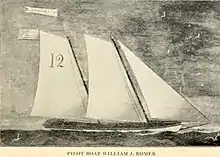William J. Romer
The William J. Romer was a 19th-century pilot boat built in 1841 for the New York Pilots. She was considered one of the fastest pilot-boats out of New York. In 1846, the Romer sailed across the Atlantic on a special express trip to Liverpool, England. The Romer Shoal Light was named for the Romer, which sank there in 1863.
 Pilot Boat William J. Romer, Captain James McGuire, Leaving for England February 9th, 1846. Painting by Nathaniel Currier. | |
| History | |
|---|---|
| Name: | William J. Romer |
| Owner: | James J. Wilkie, James Conner, Robert W. Johnson, and George H. Sisco. |
| Builder: | John & James Friend shipyard |
| Cost: | $4,000 |
| Launched: | 1841 |
| Out of service: | July 20, 1863 |
| Stricken: | Romer Shoal |
| Fate: | Sank |
| General characteristics | |
| Class and type: | schooner |
| Tonnage: | 50-tons TM |
| Length: | 70 ft 0 in (21.34 m) |
| Depth: | 10 ft 0 in (3.05 m) |
| Propulsion: | Sail |
Construction and service
The pilot-boat William J. Romer, No. 12, was built in New York in 1841 by John & James Friend shipyard, valued at $4,000. She was owned by James J. Wilkie, James Conner, Robert W. Johnson, and George H. Sisco.[1]
On February 9, 1846, the Romer was selected to sail across the Atlantic, for a faster trip than with conventional Packet boats. She went on a special express trip to Liverpool, England to obtain the latest news from Great Britain regarding the United States acquiring land in Oregon and England’s position on the matter.[2] Monroe Forbes Gale, a selected representative of the Associated Press and William Brogan were the only passengers. Her officers and crew consisted of Captain James McGuire, two mates, a steward, and two seamen.

On the way over the Romer overcame a heavy storm. The Cork Harbour was reached on March 10, 1846. Monroe Gale went to Liverpool with his mail and Tribune dispatches. The Romer returned to New York on April 11, 1846.[3] On June 15, 1846, Secretary of State James Buchanan and British Minister Richard Pakenham signed a treaty that settled the Oregon boundary dispute by agreeing upon lat. 49 N. as the boundary-line.[4][5]
On March 12, 1860, the Sandy Hook pilot-boat William J. Romer, No. 12, was sold to go to Texas, to be used as a pilot-boat at the port of Galveston.[6]
On October 10, 1860, New York Sandy Hook Pilot George H. Sisco, of the pilot boat William J. Romer, No. 1, signed a statement along with other pilots, that he was satisfied with the representation he had received from the New York Board of Commissioners of Pilots.[7]
End of service
On July 20, 1863, during the American Civil War the pilot-boat William J. Romer was wrecked off Barnegat Bay. She struck a submerged rock and sank, with the loss of one pilot. The Romer Shoal Light in New York Harbor was named for the Romer that sank there.[8]
References
- "Pilot Boat Wm J Romer". The New York Daily Herald. New York, New York. 22 Jul 1863. p. 8. Retrieved 10 October 2020 – via Newspapers.com.
- "Death of an Old Printer". The Indiana State Sentinel. Indianapolis. 2 June 1880. p. 5. Retrieved 9 October 2020 – via Library of Congress
 .
. - "Voyage Of The Pilot-Boat William J. Romer Across The Ocean". New-York daily tribune. 15 April 1846. p. 1. Retrieved 9 October 2020 – via Library of Congress
 .
. - Russell, Charles Edward (1929). From Sandy Hook to 62°. New York: Century Co. p. 91. OCLC 3804485.
- Allen, Edward L. (1922). Pilot Lore From sail to Steam. New York: The United New York and New Jersey Sandy Hook Pilots Benevolent Associations. p. 71.
- "Sale Of The Pilot-Boat Romer". The New York Times. New York, New York. 12 Mar 1860. p. 1. Retrieved 9 October 2020 – via Newspapers.com.
- "The New York Pilots. To The Editor Of The Herald". New York Daily Herald. New York, New York. 10 Oct 1860. p. 2. Retrieved 2021-01-28.
- Mirza, Umair (2008-11-01). Encyclopedia of Civil War Shipwrecks. New York, New York. p. 142. Retrieved 10 October 2020 – via Internet Archive
 .
.